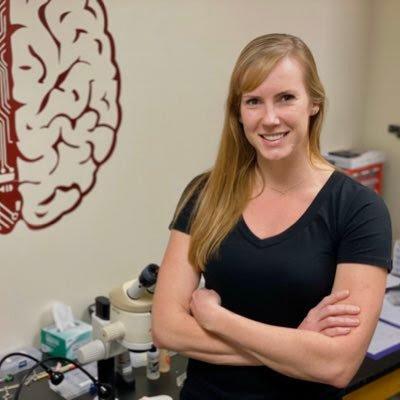
Lindsay Halladay awarded Young Investigator Grant
SANTA CLARA, Calif., Oct. 14, 2021—Lindsay Halladay, assistant professor of Psychology and Neuroscience at Santa Clara University, has been awarded the Brain & Behavior Research Foundation’s Young Investigator Grant. Awarded to promising young scientists who are making groundbreaking discoveries in neurobiological research, the two-year $70,000 grant will fund her research investigating the neural mechanisms by which traumatic events experienced early in life can incite life-long impairments in social- and anxiety-related behaviors. One of 150 scientists from renowned institutions across the globe, Halladay is the first researcher at SCU to receive this prestigious award.
“I am truly honored to receive the Young Investigator Award from the BBRF,” says Halladay. “The award will fund research I am passionate about while also providing support for student researchers in my lab.”
The BBRF’s mission is to alleviate suffering caused by mental illness by funding research likely to lead to scientific breakthroughs. President, Jeffrey Borenstein, M.D., stated in a prior press release that recipients of the Young Investigator Award “represent a new generation of scientists who will pioneer breakthroughs in mental health research.”
Halladay’s research is focused on discovering how traumatic events early in life increase susceptibility for anxiety disorders. Nearly one percent of children in the U.S. experience abuse or neglect, which can drastically alter neural development, leading to lifelong mental health conditions that include social anxiety, attachment disorders, difficult peer relations, and externalizing behaviors. Prior research on the neurobiological consequences of exposure to trauma during critical periods of development has mostly focused on dysregulation of stress hormones, especially with regard to the hypothalamic pituitary adrenal (HPA) axis. However, less is known about early trauma-induced deficits specific to social behaviors. Social behavior involves coordination between neural circuits promoting reward and circuits inhibiting anxiety, but the extent to which early life trauma incites social behavioral deficits through reward- or anxiety-related mechanisms has yet to be determined. Halladay plans to untangle this, which is a critical step toward identifying effective therapeutic treatments for social disorders spurred by childhood abuse and neglect.
Last year, Halladay and SCU undergrad co-authors published work implicating a brain region, the bed nucleus of the stria terminalis (BNST), in mediation of the social deficits observed following early life trauma. “The BNST acts as a hub for both anxiety and reward processing in the brain, so our next research goal is to pinpoint the specific BNST projections to downstream targets that mediate the social deficits we are seeing,” says Halladay. “Determining whether early life stressors produce dysfunction in reward or aversion circuitry will take us one step closer to identifying potential therapeutic targets for individuals afflicted with the psychological aftermath of childhood trauma.”
Research funded by the BBRF Young Investigator Grant will be conducted with the help of undergraduate student researchers in Halladay’s behavioral neuroscience lab on campus, now located in SCU’s new Sobrato Campus for Discovery and Innovation.
About the College of Arts and Sciences at Santa Clara University
The College of Arts and Sciences is the heart of Santa Clara University. Our faculty integrate transformative teaching and innovative scholarship to engage students in the processes of learning, discovery, and reflection as members of a community of scholars. For more information, visit www.scu.edu/cas.
About Santa Clara University
Founded in 1851, Santa Clara University sits in the heart of Silicon Valley—the world’s most innovative and entrepreneurial region. The University’s stunningly landscaped 106-acre campus is home to the historic Mission Santa Clara de Asís. SCU has among the best four-year graduation rates in the nation and is rated by PayScale in the top 1 percent of universities with the highest-paid graduates. SCU has produced elite levels of Fulbright Scholars as well as four Rhodes Scholars. With undergraduate programs in arts and sciences, business, and engineering, and graduate programs in six disciplines, the curriculum blends high-tech innovation with social consciousness grounded in the tradition of Jesuit, Catholic education. For more information see www.scu.edu
Media Contacts
Deepa Arora | SCU Communications | darora@scu.edu